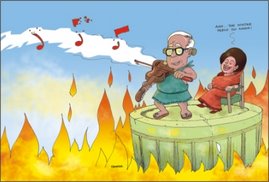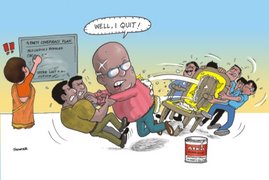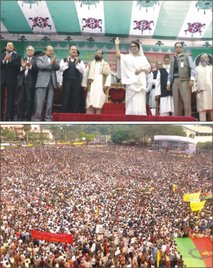The Government has banned political and trade union activities and restricted provocative news, including talk show, in print and electronic media under the Emergency Powers Rules 2007. The ban has been made effective from January 12, 2007 through a gazette notification on the Emergency Powers Rules 2007 under the Emergency Powers Ordinance 2007. The gazette notification was made public last night.
The government has restricted processions, demonstrations, hartals, strikes and lockouts across the country to ensure security of the state and people, and maintain discipline in public life and has also banned student-teacher politics and politics by government employees and professional bodies. In case of violation of the restrictions, the offenders will have to suffer a maximum of five years or a minimum of two years rigorous imprisonment along with fines. But rallies, processions and functions relating to religious, social and state affairs are exempted from the restrictions.
Under the notification, the government can ban any meeting, procession, siege, demonstration, speech, statement, any harmful news or information in the interest of government, state or public security and peace. The government can also restrict any publication or transmission of any anti-government news, editorial, post editorial, article, feature, cartoon, talk show or discussion in print or electronic media and any mass media, including the internet. Wall writing has also been banned as long as the state of emergency will remain in force. The government will be able to proscribe any newspaper, book, document, printing press or equipment of electronic media if any news or information is published or propagated violating the government order or restrictions.
The restriction has also been put on any provocative remarks or activities against the government and its programmes, drawing, cartoon or the effigy of an individual with ulterior political motive. The government will have the right to ask any individual to submit information or material to a person or authority designated by the rules for examining those. If any individual does not submit the information or the material or intentionally supply false and incorrect ones, the individual will have to suffer a maximum of five years or a minimum of two years' RI and fines. Those who will try to violate the rules and assist or provoke to violate the rules of the emergency will be considered as the violator.
If any violator of the rules is identified as statutory organisation or farm, director, owner, partner, manager, secretary or any other officer or agent will be considered as the violator unless he or she can prove that they have tried enough to refrain from violating the rules. Whatever the existing laws and rules contain, all offences under the emergency rules will be justified by speedy trial court, speedy trial tribunal, metropolitan magistrate and first class magistrate. The offences under this rule will be considered as cognizable, non-compoundable and non-bailable.
If anyone resents any verdict of the courts, he or she can appeal to the proper court against the verdict within 30 days from the date of handing down the particular verdict. But the time to be spent to get the certified copy will be excluded from the 30-day period. On post, radio, telegram, telex, fax and telephone services, the rules of emergency said the government can empower officers and authorities to halt, delay any disbursement of messages or news.
In case of any serious offence, the government will have the right to transfer an under trial case at any stage to a speedy trial tribunal. But the trial must be held as per the provisions of the Speedy Trial Tribunal Act 2002. Investigation, trial and other related activities on the offences that cause law and order situation will be under the speedy trial court only. Any designated police official or any member of the law enforcement agencies will be able to enforce or take any necessary steps to implement any order under the emergency rules. Any individual can be brought to preventive detention under the Special Powers Act 1974 if deemed that the individual might create an offence under the emergency rules.
Showing posts with label news. Show all posts
Showing posts with label news. Show all posts
Saturday, January 27, 2007
Wednesday, January 24, 2007
CA asks Govt.officials to discharge duties neutrally

Chief Adviser (CA) to the Caretaker Government, Fakhruddin Ahmed in his first meeting with secretaries to the ministries yesterday asked the secretaries to be neutral and honest in their duties and support him in bringing back the people trust in bureaucrats. He also warned them of severe punitive measures if they fail to remain impartial.
In the meeting, pointing out that tax paid by the citizens pay for government officials' wages and also runs the government, Fakhruddin stressed that "Government officials have to remember that no political party is their master. They are the servants of the people's republic" and all officials have to ensure that the government services are delivered to the people's doorsteps. He assured that whatever changes are required to ensure impartiality in the administration, will be brought into existence. Fakhruddin said that "The responsibility of running the country lies with a government elected by the people, and he requested the officials to assist the council of advisers in fulfilling the prerequisites for holding an election, namely the people's trust in the administration.
Addressing the secretaries he said that the caretaker government will do all it can to revitalise all sectors of the economy. Emphasising the need for strengthening the power sector, the CA said all steps should be taken immediately to ensure power supply to factories, offices and households. Commenting on the improved law and order situation over the past week, Fakhruddin said the caretaker government is resolute in making it sustainable to ensure public security.
The CA praised small farmers for sustaining the country, and said they have been let down by the lack of assistance from the government, especially regarding supply of fertilisers. He also said relationships with friendly countries should be strengthened and steps should be taken to brighten Bangladesh's image abroad. The CA urged the secretaries to be more proactive in ensuring implementation of ongoing development projects and said that "any delay or failure in implementing projects will not be tolerated". Fakhruddins's meeting with the secretaries was held at Bangladesh Secretariat and longed for about two hours, where he later spent hours in his own office.
Labels:
Bangladesh Elections,
CA,
elections in bangladesh,
Fakhruddin,
media,
news,
parties,
Politics,
sheikh hasina
Wednesday, December 20, 2006
National Assembly Elections - 2007
Bangladesh is a parliamentary democracy, since Independence. Bangladesh started its journey with the Parliamentary System of Government, then switched over to the Presidential System and in 1991 reverted to the Parliamentary system. Its 1972 constitution has been amended several times. The president is chief of state and the prime minister heads the government.
The ruling government took power on Oct 2001 and the term ended on Oct 2006 . According to the current poll schedule, Bangladesh 2007 National Assembly Election will be held on January 22. The last date for filing nomination papers for the ninth parliamentary election will be December 21.
Bangladesh's political scene has been tumultuous since independence. Periods of democratic rule have been interrupted by coups, martial law, and states of emergency. In the midst of this confusing scene, there are 5 major political forces in the country. The Bangladesh Nationalist Party (BNP) and its allies forming the right-of-center to conservative grouping in Bangladesh and is currently in power in Bangladesh. The current opposition is led by the Awami League (AL), which initially saw its birth as a socialistic organization but has now transformed into a center/center-left political stream. To the left are the pro-Soviet Bangladesh Communist Party, factions of the Jatiyo Samajtantrik Dal, and other socialist groups advocating revolutionary change. To the right is a group of parties, including Jamaat e Islami and Islami Oikyo Jote, who calls for an increased role for Islam in public life. The fifth major pary is the party founded by ex-military ruler General Ershad, the Jatiyo Party (JP) is ideologically not too different from the AL or the BNP but operates independently.
Election -2007
The ninth parliamentary elections are scheduled for January 2007, with political alliances led by the Bangladesh Nationalist Party (BNP) and Awami League (AL) in the fray. The main issues include poor performance and mal-governance, rise of extremism and, most importantly, holding free and fair elections despite a deteriorating law and order situation in the country.
The last five years rule was plagued with disapproval by the liberals and moderates. Despite this, the ruling alliance sought to strengthen itself and widen its electoral reach. The BNP and its two allies, Jamaat-e-Islami and Islami Oikya Jote, are likely to be joined by an entrenched political force, the Jatiya Party (JP) led by H.M. Ershad. This political alliance between ultra-rightists (Islamic Parties) and the BNP is of concern, as their political platform is anchored in an undemocratic military ethos, strong enough to defeat the liberal democratic forces. On the other side, BNP dissidents like AKM Badrudozza Chowdhary (Bikalpa Parisad) and Deputy Speaker of Jatiya Sansad, along with some MPs of the newly formed Liberal Democratic Party have joined the 14 parties opposition led by the Awami League, which has enthused this new alliance of liberal democratic forces.
The ruling government took power on Oct 2001 and the term ended on Oct 2006 . According to the current poll schedule, Bangladesh 2007 National Assembly Election will be held on January 22. The last date for filing nomination papers for the ninth parliamentary election will be December 21.
Bangladesh's political scene has been tumultuous since independence. Periods of democratic rule have been interrupted by coups, martial law, and states of emergency. In the midst of this confusing scene, there are 5 major political forces in the country. The Bangladesh Nationalist Party (BNP) and its allies forming the right-of-center to conservative grouping in Bangladesh and is currently in power in Bangladesh. The current opposition is led by the Awami League (AL), which initially saw its birth as a socialistic organization but has now transformed into a center/center-left political stream. To the left are the pro-Soviet Bangladesh Communist Party, factions of the Jatiyo Samajtantrik Dal, and other socialist groups advocating revolutionary change. To the right is a group of parties, including Jamaat e Islami and Islami Oikyo Jote, who calls for an increased role for Islam in public life. The fifth major pary is the party founded by ex-military ruler General Ershad, the Jatiyo Party (JP) is ideologically not too different from the AL or the BNP but operates independently.
Election -2007
The ninth parliamentary elections are scheduled for January 2007, with political alliances led by the Bangladesh Nationalist Party (BNP) and Awami League (AL) in the fray. The main issues include poor performance and mal-governance, rise of extremism and, most importantly, holding free and fair elections despite a deteriorating law and order situation in the country.
The last five years rule was plagued with disapproval by the liberals and moderates. Despite this, the ruling alliance sought to strengthen itself and widen its electoral reach. The BNP and its two allies, Jamaat-e-Islami and Islami Oikya Jote, are likely to be joined by an entrenched political force, the Jatiya Party (JP) led by H.M. Ershad. This political alliance between ultra-rightists (Islamic Parties) and the BNP is of concern, as their political platform is anchored in an undemocratic military ethos, strong enough to defeat the liberal democratic forces. On the other side, BNP dissidents like AKM Badrudozza Chowdhary (Bikalpa Parisad) and Deputy Speaker of Jatiya Sansad, along with some MPs of the newly formed Liberal Democratic Party have joined the 14 parties opposition led by the Awami League, which has enthused this new alliance of liberal democratic forces.
Subscribe to:
Posts (Atom)





